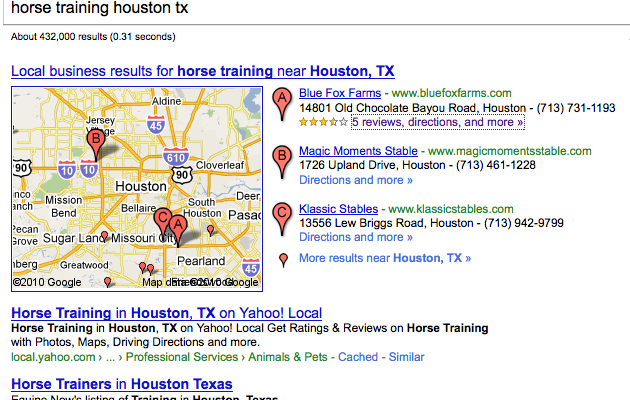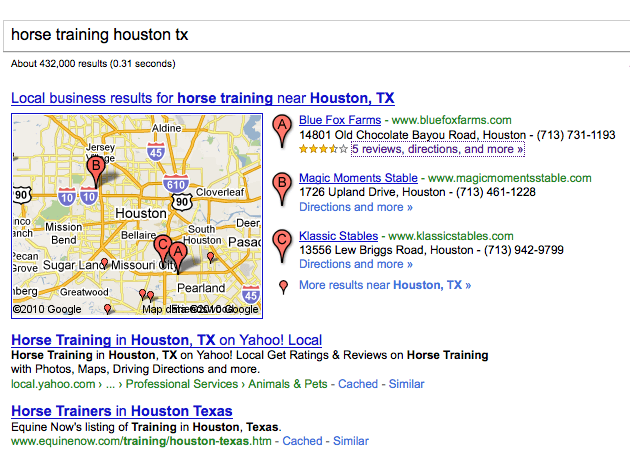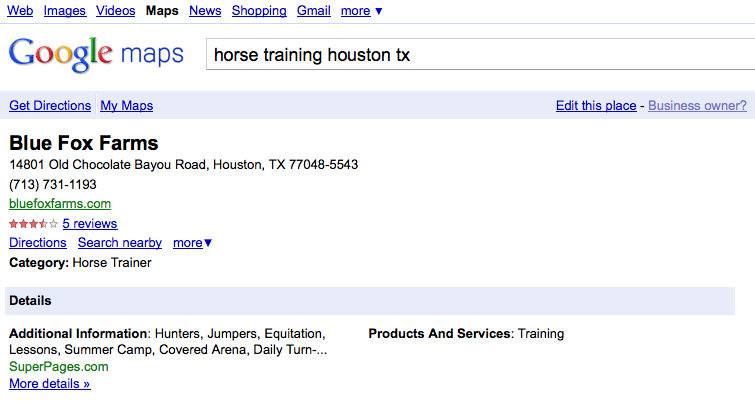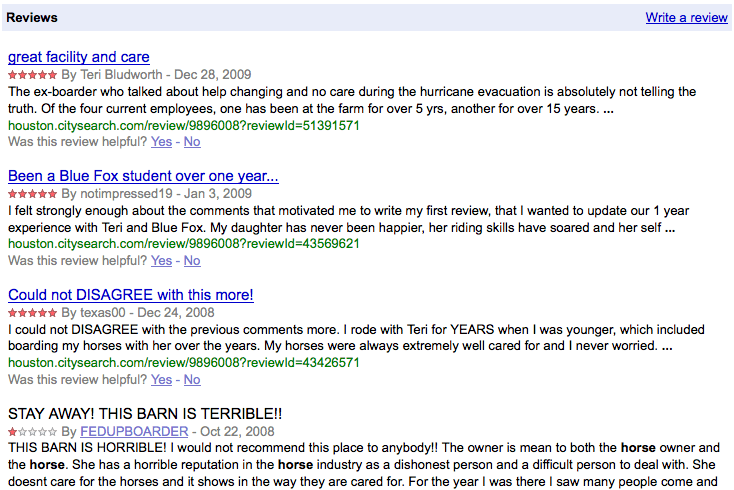Over the last week, I’ve met with several small business owners, and we’ve talked about their strategies for using the Web and social media. Almost without exception, these business owners have ignored using the small business listings provided by Google, Yahoo, Microsoft Bing and other Web listing services. They’ve spent thousands of dollars building websites and, in some cases, creating Facebook and Twitter pages and Linkedin profiles. Most of this money is misused because they ignore some fundamental truths that I will list for you here. To illustrate my points in using the Web to search for businesses, I’ve become a Houston-area horse owner looking for a place to have my horse trained.
- Truth One — Google and Yahoo and Bing own the big search engines. Unless prospective clients already know your business name, they will very likely use one of these search engines to find your business, using keywords associated with your business. Whatever shows up at the top of the first page of search results is determined by the ranking algorithms used by the search engines. You can have the most beautiful website in the world with the most appealing content, but unless these search engines rank your site as one of the most relevant results for the keywords used, your site will languish unseen in the “back pasture” of pages 2, 3, or more. Furthermore, Google and the other search engines will usually place its local business listings at the top of page one — this is prime territory and your business needs to be displayed here!
Google Search Results for "horse training houston tx." Here’s a search for “horse training houston tx” in Google.
- Truth Two — Google and the others prefer their own local listings. For most business sectors, Google gets about 70% of the searches with Yahoo and Bing splitting the remainder. This means that your Google local business listing should be the first one you claim. What do I mean by “claim”? Google allows you to assert ownership and control over the content of the listing. You can add pictures and videos, add business categories, correct the map display, add a business description, add hours of operation, include special announcements, list methods of payment, and so on. How much does this cost? It’s free! That’s why it’s absolutely wasteful to spend lots of money on a website, and ignore these free listings provided by the search engines.
Google business listing for Blue Fox Farm Here, I’ve picked out Blue Fox Farm’s local listing, and by looking at the upper right corner of the listing, I can see that it hasn’t been claimed — Google still displays a link to claim the listing.
- Truth Three — Google and the others display reviews from your clients. The major search engine business listings collect client reviews directly and they also collect reviews from other sources like Citysearch.com, Judysbook.com, Kudzu.com, and others. If your clients leave reviews anywhere, those reviews will eventually be displayed very prominently with your local listing, whether you claim it or not!
Blue Fox Farm Client Reviews In the screenshot, Blue Fox Farms received a very negative review, apparently from a former boarder, and other Blue Fox Farms clients rallied to defend the Farm’s owner with positive reviews. Having a couple of negative reviews can actually add credibility to the positive ones, and Blue Fox Farms has some very loyal clients. However, five reviews must represent only a tiny fraction of the Farm’s boarding, training, lessons, and sales clients over the last few years. This indicates that Blue Fox Farms probably doesn’t have any loyalty survey process in place and has no process to encourage clients to leave recommendations and referrals online. Given the prominence of these search engine listings, and the visibility of these client reviews, this is not wise!
Do a search for your own business type using Google and the other search engines. Use the keywords your potential clients would use. See where you rank in search results and take a look at your local business listings from the perspective of those potential clients. If you do, you’ll probably take the time to claim and update your local business listings and then set up a client loyalty process to encourage positive online referrals and recommendations. It will do you more immediate good than new Twitter, Facebook, and Linkedin profiles combined!
Need help? Call Rust Reviews to get you started!



